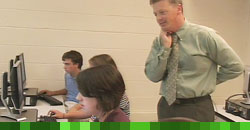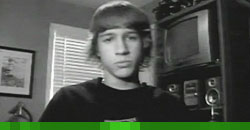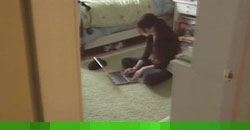


Dear FRONTLINE,
Thank you for explaining what I am seeing in my middle school classroom.I feel for the teacher that feels behind the times. I am a 36-year veteran teacher. I am also the technically adapt teacher who has it all and uses all the bell and whistles. I see a lack of interest in what is going on in the classroom and a total absorption with IMing on cell phones and using the computers only for online work with their FacePage's. I see a change in the last three years of the students I have been teaching.
I also felt more time should have been devoted to the hours children spend looking at porn on the internet. I have many students who stay up all night to do their online viewing. They come in and they are too tired to work.
Terry Daugherty
Bloomington, In
Dear FRONTLINE,
I'd like to respond to the viewer from DePere, WI. The viewer criticized one of the mother's on the program saying "she has no right to interfere with her kid's life to that extent." I believe this is the problem- too many parents feel that it is not their right to be involved in their child's "personal life." If the parent is paying the mortgage or rent, it is there home! If they are paying for the internet service they have EVERY right to know what their children are doing online. I am a student minister at a church and I work with teenagers on a regular basis and I see this all the time. Parents must stop worrying about "offending" their kids, stop trying to be their friend, and be the PARENT!
Brandon, MS
Dear FRONTLINE,
I enjoyed the program and thought it was a fair overview of the major issues of being online. I'm glad it wasn't the usual fearmongering that I see in much of the media.
Keep the computers in a public place in your home, have some reasonable limits, and parents... stay involved and know your kids. Spend some time with them. Talk to them.
There are tools to help parents limit computer time and filter content, but the best internet filter is the watchful eye of a parent.
I'm going to recommend this show to all parents. I think it's just an eye opener for just how pervasive digital media has become in our children's lives.
Mark Sicignano
Madison, CT
Dear FRONTLINE,
If your children are online, you should be too. Parents can open their own accounts on Myspace and Facebook and don't need to be in the dark. I joined -- my kids showed me how -- and some of my children's friends accepted my invitation to be a friend. You can look at their friends and increase your contacts and be present in their online universe. Be respectful, but don't be naive.
One of my own children immediately accepted my invitation as a friend, but I got news about the other from friends pages until he also did. Neither has anything much that I would object to, and I don't hound them or their pages, but Facebook does give me news updates about their activities and more importantly what they are thinking about.
It's a new world, but we don't have to cede our places in it.
K Vaughan
Brooklyn, NY
Dear FRONTLINE,
Thank you for an excellent and timely report.
What I find most troubling is actually not so much the issue of what young people are doing online, as much as the way so many parents relinquish their authority as parents. It's astonishing to hear these kids refer to their "rights", in particular their right to privacy. Why is no one willing to explain to them that they don't yet possess these rights? They will, in a very short amount of time, have the right to drive a car, to vote, to serve in the armed services, to determine the course of their lives. But right now, those decisions are in the hands of their parents.
My kids (all teens, one now in college) understood that until they were 18, they had no "rights" to online privacy. Even more importantly, I made sure they understood that ultimately, there is no such thing. In time, they watched friends learn these lessons the hard way.
It disturbs me to see parents being intimidated by their children. It's just not that complicated. These kids don't want to allow their parents to see what they are doing online? Pull the plug. No more access. Talk to the parents of their friends and explain that they are not allowed to go online at their home. If the other parent does not share or respect your concern, don't allow your child to go there. invite those friends to come to your house instead. But teach your children respect. Respect for tools like the internet that are easily abused, respect for others and themselves.
Give them time to grow up before putting this tool in their hands.
Black Mountain, NC
Dear FRONTLINE,
Growing Up Online provides an interesting look at the role of the Internet on a segment of the human population. Sadly it fails to examine the effect of the Internet on the lives of youth from socio-economically disenfranchised (poor) communities in America and globally.
I was raised in the Chatham area, and have spent my adult life in the inner city producing and teaching media. The youth I know have used the Internet to start small businesses, teach themselves careers, and to communicate with a world they previously could not access. It is the classroom, the library and the university they never had -- fully stocked, affordable, and eager to embrace them.
The Internet is the greatest act of democracy in the history of humans. As stated by Danah Boyd from the Berkman Center for Internet & Society, we must teach people how to use new technology safely, not destroy it with censorship.
Pam Timpson
Jersey City, New Jersey
Dear FRONTLINE,
I was pleased to see how Frontline handled the issues surrounding teens and the online world. The tone of the piece was realistic, and offered useful guidance to parents and other adults feeling befuddled by the revolutionary new world, for it really is a very different world. I think the program underscored the fact that alarmist parents can do damage to their relationships with their kids if they succumb to all of their fears about this new world instead of taking time to listen to their children share how they live in this world, and what it means to them. It can be a tough thing to do, but as the program makes clear, the Internet is not going away. Let's learn this new language.I am Education Director of the non-profit organization The Leaning About Multimedia Project (LAMP) located in Brooklyn, New York. We run media literacy workshops for children, teens, parents and educators in Brooklyn. If you're interested in finding out more about us, please see our website www.thelampnyc.orgKatherine G. Fry, PhD
Katherine Fry
Brooklyn, New York
Dear FRONTLINE,
Parents should just take the internet away, period. Also cell phones. So many american kids have an overweening sense of entitlement and should learn humility and respect, values forgotten in today's mindless consumerist culture with its electronic trinkets. Why do today's american parents lack the courage to exercise their responsibility?
albany, ny
Dear FRONTLINE,
I just watched the program on kids growing up online. I was very angry with the mother, I believe her name was Even Skinner. She has no right to interfere with her kid's life to that extent. She is only driving her kids farther away from her. She is too paranoid about what happens online. I was also quite disturbed on how she could rationalize what she felt she was entitled to. As for Ryan Halligan's family, my sympathies go out to them. I cannot imagine what that situation must be like. I am very happy the father did what he did by trying to find a solution for what his son did.
DePere, wi
Dear FRONTLINE,
While this Frontline report was more balanced than most of the hysteria found in the media regarding young people and the Internet, it still chose to present this whole topic solely as a problem to be solved. If you are going to entitle a program "Growing Up Online," don't you need to explore the overwhelming benefits that information technology is bringing to young people's lIves and TO their education? Instead, this program just assumed a problem, and worked from there. Would a treatment of the information technology revolution in the workplace focus on the problem of workers downloading pornography and other other online means for wasting time in the office? I think not. It would acknowledge these, but would do so in the larger context of the extraordinary benefits. But because this is about kids, apparently the producers thought it needed to be "problem" and "crisis" oriented. Too bad. A missed opportunity to understand and explore what it REALLY means to grow up online. An an insult to the vast majority of kids who take their lives seriously -- both online and off.
Washington, DC
Dear FRONTLINE,
I actually grew up in Madison and had many friends who graduated from Madison, Chatham, and Morristown high schools, so it was very interesting to watch this particular episode, having lived through it (albeit without an Internet).
I would say that Madison and Chatham are a bit too affluent to truly represent a cross-section of America.
And Evan Skinner's statement that Chatham is the kind of town where parents are involved in their kids' lives is a bit narrow-visioned; it may be so in her social group and among parents she deals with in the PTO, but it does not make it so for the entire town. I knew plenty of kids from Chatham on both sides of the parental involvement scale.
somerville, ma
Dear FRONTLINE,
Very well done. The internet and social networking sites are not going away. I am a youth pastor, and from my experience most kids seem to know the boundaries of online activity. However, we do need to work much harder to develop educational programs to keep teens safe and think about consequences for their actions online. Furthermore, we must pour more money and research into how to use technology to actively engage with students and their rapidly changing learning styles brought about by the rapid rise of internet usage. Thanks for a program very well done.
Mike Havens
Muskoge, Oklahoma
Dear FRONTLINE,
I know I may be old fashioned, but why do parents/kids assume that a kid is entitled to do whatever (Facebook, MySpace). Under my roof, my rules, we may discuss them, we may negotiate them, the rules may bend, but ultimately "I am the parent and you are my child." I am not saying that I want to snoop, but if the rest of the world can watch what you put on the computer, so can I.
Rochester, NY
Dear FRONTLINE,
What a great program. I started watching it because I teach Media Studies to high school students and thought that it would be a good addition. I now want to have the staff at our high school watch it and have a discussion.
If we don't start to communicate with our children with an awareness of where they are, we'll never communicate with them at all. Schools need to integrate the technologies that children use or we are doomed to lose the generation.
Kevin Lee
Springfield, New Hampshire
Dear FRONTLINE,
I'm a school teacher and the PBS story really impressed me. I have a ninth grader that I recently bought a computer. I need some guidelines so I won't get into his life that much. But how can I keep a close eye and what are the symptoms?
angel maldonado
Barranquitas, PR
FRONTLINE's editors respond:
Check out this feature and our Readings and Links for tips and resources on how to keep your kids safe online.